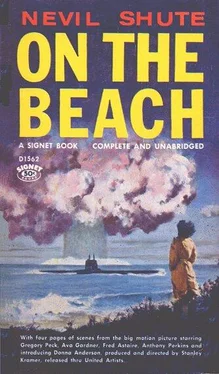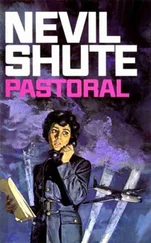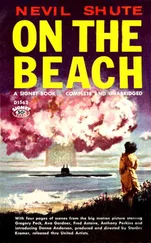He pulled the trailer and his bicycle down from the verandah on to the lawn and fitted the trailer hitch; then he mounted and rode off. He had four miles to go to fetch the milk and cream, for the transport shortage now prevented all collections from the farms in his district and they had learned to make their own butter in the Mix-master. He rode off down the road in the warm morning sunlight, the empty billies rattling in the trailer at his back, happy in the thought of work before him.
There was very little traffic on the road. He passed one vehicle that once had been a car, the engine removed and the windscreen knocked out, drawn by an Angus bullock. He passed two riders upon horses, going carefully upon the gravel verge to the road beside the bitumen surface. He did not want one; they were scarce and delicate creatures that changed hands for a thousand pounds or more, but he had sometimes thought about a bullock for Mary. He could convert the Morris easily enough, though it would break his heart to do so.
He reached the farm in half an hour, and went straight to the milking shed. He knew the farmer well, a slow-speaking, tall, lean man who walked with a limp from the Second World War. He found him in the separator room, where the milk flowed into one churn and the cream into another in a low murmur of sound from the electric motor that drove the machine. "Morning, Mr. Paul," said the naval officer. "How are you today?"
"Good, Mr. Holmes." The farmer took the milk billy from him and filled it at the vat. "Everything all right with you?"
"Fine. I’ve got to go up to Melbourne, to the Navy Department. I think they’ve got a job for me at last."
"Ah," said the farmer, "that’ll be good. Kind of wearisome, waiting around, I’d say."
Peter nodded. "It’s going to complicate things a bit if it’s a seagoing job. Mary’ll be coming for the milk, though, twice a week. She’ll bring the money, just the same."
The farmer said, "You don’t have to worry about the money till you come back, anyway. I’ve got more milk than the pigs will take even now, dry as it is. Put twenty gallons in the creek last night—can’t get it away. Suppose I ought to raise more pigs, but then it doesn’t seem worth while. It’s hard to say what to do." He stood in Silence for a minute, and then he said, "Going to be kind of awkward for the wife, coming over here. What’s she going to do with Jennifer?"
"She’ll probably bring her over with her, in the trailer."
"Kind of awkward for her, that." The farmer walked to the alley of the milking shed and stood in the warm sunlight, looking the bicycle and trailer over. "That’s a good trailer," he said. "As good a little trailer as I ever saw. Made it yourself, didn’t you?"
"That’s right."
"Where did you get the wheels, if I may ask?"
"They’re motor bike wheels. I got them in Elizabeth Street."
"Think you could get a pair for me?"
"I could try," Peter said. "I think there may be some of them about still. They’re better than the little wheels—they tow more easily." The farmer nodded. "They may be a bit scarce now. People seem to be hanging on to motor bikes."
"I was saying to the wife," the farmer remarked slowly, "if I had a little trailer like that I could make it like a chair for her, put it on behind the push bike and take her into Falmouth, shopping. It’s mighty lonely for a woman in a place like this, these days," he explained. "Not like it was before the war, when she could take the car and get into town in twenty minutes. The bullock cart takes three and a half hours, and three and a half hours back; that’s seven hours for travelling alone. She did try to learn to ride a bike but she’ll never make a go of it, not at her age and another baby on the way. I wouldn’t want her to try. Rut if I had a little trailer like you’ve got I could take her into Falmouth twice a week, and take the milk and cream along to Mrs. Holmes at the same time." He paused. "I’d like to be able to do that for the wife," he remarked. "After all, from what they say on the wireless, there’s not so long to go."
The naval officer nodded. "I’ll scout around a bit today and see what I can find. You don’t mind what they cost?"
The farmer shook his head. "So long as they’re good wheels, to give no trouble. Good tires, that’s the main thing—last the time out. Like those you’ve got."
The officer nodded. "I’ll have a look for some today."
"Taking you a good bit out of your way."
"I can slip up there by tram. It won’t be any trouble. Thank God for the brown coal."
The farmer turned to where the separator was still running. "That’s right. We’d be in a pretty mess but for the electricity." He slipped an empty churn into the stream of skim milk deftly and pulled the full churn away. "Tell me, Mr. Holmes," he said. "Don’t they use big digging machines to get the coal? Like bulldozers, and things like that?" The officer nodded. "Well, where do they get the oil to run those things?"
"I asked about that once," Peter said. "They distill it on the spot, out of the brown coal. It costs about two pounds a gallon."
"You don’t say!" The farmer stood in thought. "I was thinking maybe if they could do that for themselves, they might do some for us. But at that price, it wouldn’t hardly be practical...
Peter took the milk and cream billies, put them in the trailer and set off for home. It was six-thirty when he got back. He had a shower and dressed in the uniform he had so seldom worn since his promotion, accelerated his breakfast, and rode his bicycle down the hill to catch the 8:15 in order that he might explore the motor dealers the wheels before his appointment.
He left his bicycle at the garage that had serviced his small car in bygone days. It serviced no cars now. Horses stood stabled where the cars had been, the horses of the business men who lived outside the town, who now rode in in jodhpurs and plastic coats to stable their horses while they commuted up to town in the electric train. The petrol pumps served them as hitching posts. In the evening they would come down on the train, saddle their horses, strap the attaché case to the saddle, and ride home again. The tempo of business life was slowing down and this was a help to them; the 5:03 express train from the city had been cancelled and a 4:17 put on to replace it.
Peter Holmes travelled to the city immersed in speculations about his new appointment, for the paper famine had closed down all the daily newspapers and news now came by radio alone. The Royal Australian Navy was a very small fleet now. Seven small ships had been converted from oil burners to most unsatisfactory coal burners at great cost and effort; an attempt to convert the aircraft carrier Melbourne had been suspended when it proved that she would be too slow to allow the aircraft to land on with safety except in the strongest wind. Moreover, stocks of aviation fuel had to be husbanded so carefully that training programmes had been reduced to virtually nil, so that it now seemed inexpedient to carry on the Fleet Air Arm at all. He had not heard of any changes in the officers of the seven minesweepers and frigates that remained in commission. It might be that somebody was sick and had to be replaced, or it might be that they had decided to rotate employed officers with the unemployed to keep up seagoing experience. More probably it meant a posting to some dreary job on shorn, an office job in the barracks or doing something with the stores at some disconsolate, deserted place like Flinders Naval Depot. He would be deeply disappointed if he did not get to sea, and yet he knew it would be better for him so. On shore he could look after Mary and the baby as he had been doing, and there was now not so long to go.
He got to the city in about an hour and went out of the station to get upon the tram. It rattled unobstructed through streets innocent of other vehicles and took him quickly to the motor dealing district. Most of the shops here were closed or taken over by the few that remained open, the windows still encumbered with the useless stock. He shopped around here for a time searching for two light wheels in good condition that would make a pair, and finally bought wheels of the same size from two makes of motorcycle, which would make complications with the axle that could be got over by the one mechanic still left in his garage.
Читать дальше












